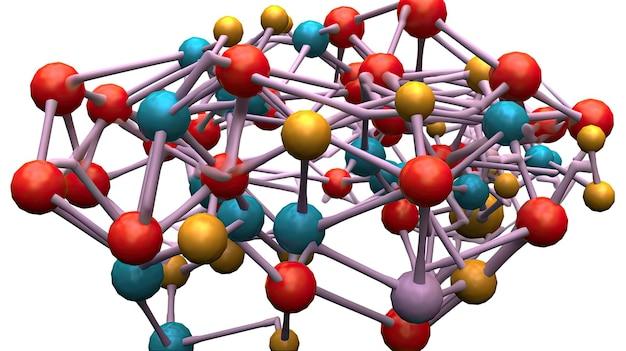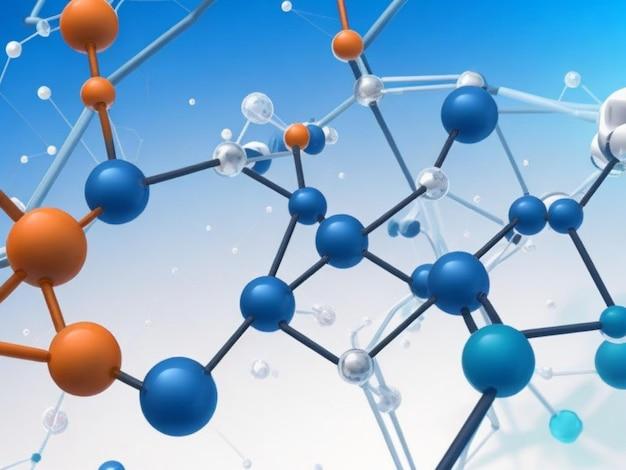Are you curious about the fascinating world of organic compounds? Wondering what they are and how they impact our daily lives? Look no further! In this blog post, we will delve into the realm of organic chemistry and unravel the mysteries behind these essential building blocks of life.
Organic compounds are compounds that contain carbon atoms, intricately linked in a variety of ways to form molecules. They can be found in all living organisms and play a vital role in everything from the food we eat to the medicines we take. In fact, organic compounds are the very foundation of life itself!
Join us as we embark on a captivating journey to discover the 10 key organic compounds that are a fundamental part of our existence. By the end of this post, you’ll not only be able to identify these compounds but also understand their importance and how they contribute to our daily lives.
So, let’s dive right in and unravel the fascinating world of organic compounds together!

What Are the Top 10 Organic Compounds
When it comes to the fascinating world of organic compounds, there are a multitude of compounds to explore and appreciate. In this quirky yet informative subsection, we’ll delve into the top 10 organic compounds that will leave you amazed by nature’s molecular magic. So put on your lab coat and let’s dive into the captivating world of organic chemistry!
Methane: The Squeaky-Clean Hydrocarbon
Let’s start our chemical journey with methane, the simplest and most abundant organic compound in the universe. Known as the “squeaky-clean hydrocarbon,” methane is composed of one carbon atom bonded to four hydrogen atoms. It’s the main component of natural gas and is released when Aunt Martha’s chili recipe doesn’t quite agree with your digestive system! This greenhouse gas is also produced by cows, earning them the less glamorous title of “methane factories” in the animal kingdom.
Ethanol: Cheers to Alcohol with a Chemical Twist
Raise your glass and say cheers to ethanol, an organic compound that’s no stranger to social gatherings. Also known as grain alcohol, ethanol is the intoxicating component found in alcoholic beverages. It’s produced through the fermentation of sugars by yeast, turning those boring grape juice molecules into a party-inducing concoction. Just remember to consume responsibly and never drink and drive, as organic chemistry and automobiles don’t mix!
Acetic Acid: The Sour Sidekick
If you’re a fan of tangy flavors, then you’re already familiar with acetic acid. This organic compound is the secret behind that mouth-puckering taste of vinegar. Fun fact: the word “acetum” in Latin means vinegar. So the next time you enjoy a plate of fish and chips with a side of vinegar, you can appreciate the sour chemistry happening on your taste buds.
Benzene: The Aromatic Ringmaster
Prepare to be mesmerized by benzene, the organic compound that steals the show with its aromatic powers. It’s like the circus ringmaster of organic chemistry, captivating everyone with its symmetrical, hexagonal ring structure. But beware, this charming compound is not to be messed with, as prolonged exposure to benzene can have adverse health effects. Keep it confined to the lab and enjoy its captivating nature from a distance.
Formaldehyde: Beauty and Preservation
When it comes to preserving scientific specimens or embalming, formaldehyde takes center stage. This organic compound is known for its unique ability to inhibit the growth of bacteria and fungi, making it an indispensable ingredient in preserving life’s curious curiosities. And yes, the familiar smell of formaldehyde might take you back to your high school biology class, reminding you of frogs and fading memories.
Aspirin: A Headache’s Arch-Nemesis
Picture this: you’re struck with a pounding headache, and all you want is some relief. Enter aspirin, the organic compound that has come to the rescue of countless throbbing brains. This wonder drug has analgesic, anti-inflammatory, and antipyretic properties. So the next time life gives you lemons in the form of a headache, grab an aspirin and show that headache who’s boss!
Caffeine: The World’s Favorite Stimulant
If you’re reading this blog post with a cup of coffee in hand, then you’re already under the enchanting spell of caffeine. Found in various plants, including coffee beans and tea leaves, this organic compound has been fueling groggy mornings and late-night study sessions for as long as humans have sought an energy boost. Just remember to appreciate caffeine in moderation, as too much can leave you feeling like a trembling squirrel on a power line.
Lactic Acid: The Exercise Aftermath
Ever wondered why your muscles scream in agony after an intense workout? Meet lactic acid, the organic compound responsible for that post-workout burn. When your body undergoes vigorous exercise, lactic acid builds up, causing the familiar sensation of muscle fatigue. So the next time you’re wobbling down the stairs after leg day, take solace in knowing that lactic acid is to blame for both your pain and your gains!
Sucrose: Sweetness in Crystal Form
Indulge your sweet tooth with a sprinkle of sucrose, the delightful organic compound that brings sweetness to our lives. Commonly known as table sugar, sucrose is made up of glucose and fructose molecules, bonded together in a captivating crystal structure. So go ahead and enjoy that scrumptious homemade cake, and let the chemistry of sucrose turn your taste buds into tiny dancing connoisseurs of sweetness.
DNA: The Blueprint of Life
Last but certainly not least, we have the grand finale of organic compounds: DNA. Often called the blueprint of life, DNA holds the secrets to our genetic makeup and plays a pivotal role in determining who we are. Its beautiful double-helix structure never ceases to amaze scientists and enthusiasts alike, leaving us in awe of the complex chemistry that forms the very foundation of life itself.
And there you have it, folks! The top 10 organic compounds that showcase nature’s boundless creativity and the wonders of organic chemistry. From the simple yet abundant methane to the intricate DNA molecule, these compounds remind us of the intricate tapestry of chemicals that make up our world. So next time you’re sipping on a cup of coffee or enjoying the tang of vinegar, take a moment to appreciate the chemical magic happening right under your nose.

FAQ: What are the 10 organic compounds
Today, we delve into the fascinating world of organic compounds. You probably have a gazillion questions about them, and luckily for you, we’ve got answers. Here are the top 10 frequently asked questions about organic compounds, answered with a sprinkle of humor and a dash of knowledge.
Is blood an organic compound
No, blood is not an organic compound. It’s a mixture of different substances, including water, red and white blood cells, platelets, and various proteins. While blood contains organic compounds like proteins and lipids, labeling it as a single organic compound would be like saying a fruit salad is just an apple.
Is baking soda an organic compound
Sorry to burst your baking bubble, but no, baking soda is not organic. It’s actually a purely inorganic compound. Baking soda, or sodium bicarbonate, is formed by combining sodium carbonate and carbon dioxide. So, if you were planning on giving your organic cookies an extra kick with baking soda, you might want to reconsider.
Is Salt an organic compound
Time to shake things up with this question. No, salt is not an organic compound. In its most common form, sodium chloride, it is classified as an inorganic compound. The fact that salt is a vital ingredient in our lives doesn’t change its inorganic nature. So, keep sprinkling it on your fries without guilt!
What are the 5 main organic compounds
Ah, the fab five of organic compounds. Pay close attention now. The five main organic compounds are carbohydrates, lipids, proteins, nucleic acids, and vitamins. They’re the backbone of life’s molecular party and play crucial roles in our bodies. Think of them as the life-of-the-organic-molecule party!
What are the 10 organic compounds
Hold tight, we’re upping the count! The world of organic compounds is vast, and we’ve rounded up the top 10 for you:
1. Carbohydrates
2. Lipids
3. Proteins
4. Nucleic acids
5. Vitamins
6. Alcohols
7. Aldehydes
8. Ketones
9. Carboxylic acids
10. Amines
These compounds rock the organic world, each with its unique chemical structure and role in biological processes. So, let’s give them all a round of applause!
Is milk organic or inorganic
Milk might seem like it comes from the organic gods, but it’s not an organic compound itself. Milk is a mixture of various organic compounds, including lactose, proteins, fats, and vitamins. It’s these compounds that give milk its awesome nutritional value. So, while milk isn’t organic, you can still enjoy a cold glass without feeling like you’re betraying the organic squad.
Does medicine contain organic compounds
Well, well, well, aren’t you a curious one? Yes, indeed, many medicines contain organic compounds. From pain relievers to antibiotics, organic compounds play a crucial role in pharmaceuticals. These compounds are carefully synthesized to interact with our bodies and achieve specific therapeutic effects. So, the next time you pop a pill, remember the organic chemists who made it all possible!
What are the different sources of organic compounds
Organic compounds can be found in a variety of sources. Here’s a quick breakdown:
1. Plants: Fruits, vegetables, grains, and herbs are abundant sources of organic compounds. They contain carbohydrates, lipids, vitamins, and other plant-specific compounds like chlorophyll.
2. Animals: Meat, eggs, and dairy products are rich in organic compounds like proteins and lipids.
3. Fossil Fuels: Petroleum, natural gas, and coal are made up of hydrocarbons, a class of organic compounds.
4. Microorganisms: Bacteria, fungi, and other microorganisms produce various organic compounds, including antibiotics and enzymes.
So, whether you’re munching on an apple, filling up your car at the gas station, or brewing a batch of kombucha, organic compounds are everywhere!
Are proteins organic or inorganic
Hold your steak knives because here comes the answer. Proteins are organic compounds. They’re made up of long chains of amino acids and are essential for various biological processes in our bodies. Proteins are like the celebrity A-listers of the organic compound world – without them, life would be quite bland.
Is olive oil an organic compound
Drumroll, please! While olive oil is undoubtedly heavenly, it’s not classified as an organic compound itself. It’s primarily composed of different types of lipids, such as monounsaturated and polyunsaturated fats. So, while it won’t fit on the organic compound guest list, olive oil is still a marvelous addition to your kitchen arsenal.
That concludes our organic compound extravaganza! We hope we’ve satisfied your curiosity and entertained you along the way. Remember, organic compounds are the building blocks of life’s molecular dance, and we’re lucky to have them in all their diverse forms. Stay curious, keep learning, and embrace the wonders of organic chemistry!
FAQ subheadings by RoCombine.ai (2023)
